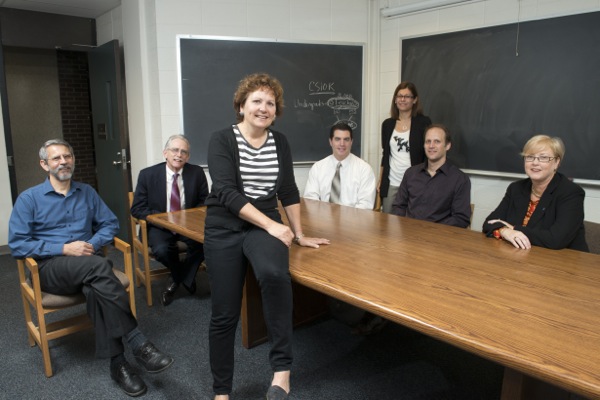
CS 10K
New program to support Delaware computer science teachers, students
10:21 a.m., Oct. 31, 2012--Like many states, Delaware faces major challenges in integrating computing into schools beyond basic keyboard literacy.
Teaching computational thinking requires commitment and resources to training teachers in both computer science skills and pedagogy that inspires students to participate in creating computing, along with integration into the mainstream curriculum.
Campus Stories
From graduates, faculty
Doctoral hooding
According to Lori Pollock, University of Delaware professor of computer and information sciences, a recent report by the state's Science, Technology, Engineering and Math (STEM) Council noted “the need for content-trained STEM teachers, particularly in engineering and technology education.”
Now, an interdisciplinary team of educators from UD is working to create and implement a new education program in the state of Delaware that will support high school and middle school educators teaching computer science (CS).
The project is funded through a three-year, $850,000 grant from the National Science Foundation under the CS 10K Project, which aims to enhance the rigor of computing courses in 10,000 high schools, taught by 10,000 well-trained teachers through knowledge-based partnerships.
Under the grant, the research team will develop:
- A summer professional development institute for grades 6-12 teachers and grades 9-12 students to jointly learn skills development, teaching training and community building;
- An online, instant-access learning resource for teachers, including regular communication with other teachers and university faculty;
- A new college service learning 1-credit course that alternates undergraduate service to teachers in the classroom with college classroom sessions for planning and reflection; and
- Quarterly teacher workshops to extend the summer professional development into the academic year.
The pilot program will be implemented with middle and high schools in five area school districts, with the goal of scaling the effort to other Delaware and regional schools.
The UD team includes experts in integrating computing into middle schools, K-12 student learning assessment and curriculum development, student-teacher communication, teacher professional training, service learning, teaching computer science to nonmajors and evaluation.
Pollock serves as principal investigator on the grant. Co-principal investigators are:
- James Atlas, and Terry Harvey, assistant professors of computer and information sciences;
- Chrystalla Mouza, associate professor in the School of Education; and
- Alfinio Flores, Hollowell Professor of Mathematics Education.
Also participating are Jon Manon, director of UD’s Mathematics and Science Education Resource Center; Mel Jurist, program manager for UD’s K-12 engineering outreach; and Kathy Pusecker, director of the Office of Educational Assessment.
The ambitious plan includes components from successful models for teacher professional development and builds on previous experience by Pollock and Harvey in partnering computer science undergraduates in service learning with middle school teachers to create learning games for their classrooms. It also leverages Mouza’s established partnerships with regional schools for education student teaching experiences.
Undergraduate students from UD will be trained in teaching and lesson planning, develop soft skills as they lead classroom instruction and work with teachers, and serve as role models to youth.
According to Pollock, few projects have tried to link teacher learning from professional development to changes in classroom practice and subsequent student outcomes.
“We hope to uncover insights into how a strategic partnership model can help develop and support teachers to improve student computational skills and interest, while providing a service learning opportunity for undergraduate students studying computer science, math education and education,” Pollock said.
Article by Karen B. Roberts
Photo by Lane McLaughlin








